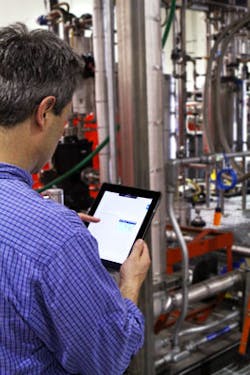Manufacturing Mobility Picks Up Speed
Manufacturing, in both its discrete and process operations, has forever been an industry of technological contrasts. On one hand, you have industries recognized not only for implementing, but actually developing advanced processes and mechanisms. You can see this in everything from Ford’s development of the assembly line to decades of advanced robotic applications. On the other hand, you have industries that are equally recognized for their determination to stick with tried-and-true technologies for multiple decades. The reasons for doing this, from safety to shutdown expenditures, all make perfect sense, but the line between being an adopter of cutting-edge technologies and a reliable, cost-efficient producer is getting harder to differentiate.
Ultimately, it’s the increasing speed with which new wireless and cellular devices and services are being rolled out that make it clear that a significant shift toward remote, mobile interactions with the manufacturing process is quickly becoming the norm.
Just this past week I received two announcements—one from an industrial automation and networking company and one from an IT services provider—that point to how widespread the adoption of mobile access to manufacturing systems is becoming.
The first announcement came from Red Lion Controls, which announced that its Sixnet IndustrialPro 6000 and RAM 6000 series of industrial cellular routers are now certified by and compatible with AT&T and Verizon’s nationwide 4G Long Term Evolution (LTE) networks. We recently reported that these routers had been certified as compatible with Bell Mobility’s LTE. The AT&T and Verizon announcement bolsters these routers’ ease of deployment across industry. Red Lion says support for additional carrier LTE networks, such as Rogers, Sprint and Telus, is planned for later this year.
The push for 4G LTE wireless connectivity is key for these routers, according to Red Lion, because manufacturers of all sizes are increasingly requiring increased data speeds when using cellular technology for primary or backup WAN connectivity. With data rates up to 100 times faster than 2G and 3G technology, Red Lion says LTE is well-suited for remote automation applications.
Moving from plant floor device communications to the enterprise side, Advanced Technology Services Inc. released Enterprise Managed Mobility Service (EMMS), a new mobility product built on the SAP Mobile Platform that it claims reduces the complexity of deploying mobile applications that run across a variety of back-end enterprise systems and mobile devices.
Targeted at large global enterprises as well as mid-sized businesses, EMMS can reportedly be used to support inventory and expense management, logistics, mobile device management, mobile security, and application deployment.


